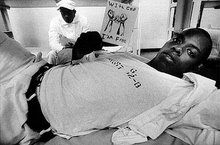 D. SMITH said...
D. SMITH said... @DMG:
@DMG:...how can you deny the relationship between these fast-food/processed food corporations and the "healthcare" organizations in this country?
 People can't feed themselves properly and eat who knows what, then land in the hospital somewhere. True healthcare is being able to take care of yourself to avoid having to be laid up on somebody's table under the knife, or stuck on some prescription medication for the rest of your life in the first place (nevermind the side effects that will have you stuck on some other medication or up on somebody else's table).
People can't feed themselves properly and eat who knows what, then land in the hospital somewhere. True healthcare is being able to take care of yourself to avoid having to be laid up on somebody's table under the knife, or stuck on some prescription medication for the rest of your life in the first place (nevermind the side effects that will have you stuck on some other medication or up on somebody else's table). To ignore that is to subscribe to this notion of convenience that the majority of people in this country are stuck on in the first place: eat a whole bunch of bullshit because it tastes good and is already prepared for you in a lab somewhere, then go take a pill or go pay for the surgery to get your big ass back down to a normal weight. That's not a personal attack on anyone who has struggled with weight issues...but it damn sure is for those who continue to ignore it and walk around talking stupid shit like "oh, you gonna die of something anyway."
To ignore that is to subscribe to this notion of convenience that the majority of people in this country are stuck on in the first place: eat a whole bunch of bullshit because it tastes good and is already prepared for you in a lab somewhere, then go take a pill or go pay for the surgery to get your big ass back down to a normal weight. That's not a personal attack on anyone who has struggled with weight issues...but it damn sure is for those who continue to ignore it and walk around talking stupid shit like "oh, you gonna die of something anyway."Michael Baisden had a show on a while ago talking about men and the fear of getting prostate cancer checkups...you know, the whole finger in the butt thing. That's all well and good if you down with that, but what in the hell happened to PREVENTION??? Why is it that no one wants to talk about how you prevent these diseases in the first place, rather make you belief you were just unfortunate and "caught something" by chance?
$147 billion...that's why.
















































































































30 comments:
That's all well and good if you down with that, but what in the hell happened to PREVENTION???
D.Smith just as full-of-shit as DenmarkVesey.
D.Smith has no earthly idea what causes cancer and still less how to prevent it.
Yeah yeah yeah .... we hear you Man Boobs.
But I got a $1,000 says a Fast Food & Factory Meat Plantation Negro porker like you gets cancer before a D. Smith.
(Gestapo Negro technocrats know how to build a watch but can't tell you what time it is)
Massa has conditioned these porch monkeys to think avoiding cancer is ridiculous:
You can hear CNu now:
"Ya'll Niggas Cayn't Pwevent No CanSuur! Who Ya'll Niggas Dinnk You Izzzz! Whyte Magne Can't Evun Pwevent Cancuh! Cancuh Iz InEviTuhble!! It Don't Mattuh What A Niggah Eats!! He Gwanna Get Cancuh Anyway!! Massa Told Meh!!"
rotflmbao
ignorant jiggaboo....,
what.causes.cancer.and.how.do.you.prevent.it?
{the answers you cobble together from hectic googling will only invalidate everything you've been preaching thus far, so laissez le bon temps roulez!!!}
All I know is that anything that causes a grown black man to grow tits ... also causes cancer.
Depends on what type of cancer. Remember, Bob Marley DIED of CANCER. Shit the man could have had minor surgery to save his life, and refused. You saying Bob wasn't eating right?
Bob Marley was poisoned.
Like Yassir Arafat.
DenmarkVesey;
1. Has no idea what causes cancer.
2. Doesn't know how to cook.
3. Is not a committed vegan.
4. Now wants to change the subject before the full extent of his ignant-assed and hypocritical nonsense is exposed to further ridicule.
CNu said...
DenmarkVesey;
1. Has no idea what causes cancer.
2. Doesn't know how to cook.
3. Is not a committed vegan.
4. Now wants to change the subject before the full extent of his ignant-assed and hypocritical nonsense is exposed to further ridicule.
CNu
1. CNu "knows" what causes cancer and will still probably get it.
2. DV doesn't eat very much cooked food anyway.
3. DV doesn't even know what a "Vegan" is. He just eats as naturally and unprocessed as he can. He avoids refined and genetically modified foods as if his life and the life of his family depends on it.
4. Change the subject? Jigaboo I started the thread. As my man D. Smith said: "how can you deny the relationship between these fast-food/processed food corporations and the "healthcare" organizations in this country?"
CNu ... that garbage food you eat and champion for others to eat IS CHANGING YOUR GENETIC CODE.
WHAT YOU EAT ... BECOMES YOUR GENES.
CNu ... that garbage food you eat and champion for others to eat IS CHANGING YOUR GENETIC CODE.
WHAT YOU EAT ... BECOMES YOUR GENES.
rotflmbao
the ingredients (including the delectable and occasional swine) that I buy and carefully prepare myself - with all the benefit of generations of skill and inherited love (baraka) - will safeguard my health and the health of my family far more effectively than Mrs. Vesey's temporary fad diet that you continually harping on like it was the second coming of Jesus.
you come to this school with a head full of mush.., and if you take any of its "curriculum" seriously - ANY OF IT AT ALL - leave with something far, far worse..,
CNu funny as shit. DMG asked the question, I provided an answer, you flip the whole thing into me not having an earthly idea as to what causes prevents cancer; presumably prostate cancer since I mentioned a finger in your butt. Did I claim to know for a fact? Nope. I simply stated that you can't deny the fact that there is a relationship between diet and these ailments. So check this out:
http://www.medicinenet.com/prostate_cancer/page2.htm
They don't pinpoint a cause either, but I definitely don't see nothing here about a finger in your butt actually preventing anything, but it does mention this:
"As mentioned previously, African-American men are 1.6 times more likely than white men to develop prostate cancer. They are also 2.4 times more likely to die from their disease as compared to white men of a similar age. These differences in diagnosis and death rates are, however, more likely to reflect a difference in factors such as environmental exposure, diet, lifestyle, and health-seeking behavior rather than any racial susceptibility to prostate cancer."
Environmental exposure, diet, lifestyle and healthseeking behavior...hmmm. CNu, would you say there is no possibility whatsoever that say, pesticides for example, could be considered a factor in environmental exposure? And what do YOU define "healthseeking behavior" as? Simply going to the doctor (which is basically how the article defined it) or eating right, exercising and basically taking care of yourself and not letting other people dictate to you what is okay to eat (the whole moderation thing) while they try to sell you all kinds of drugs in the meantime?
And I'm curious to see what YOU think or claim to know causes and can prevent prostate cancer.
I simply stated that you can't deny the fact that there is a relationship between diet and these ailments.
Why can't I deny what you've claimed as fact D.Smith?
If you don't know what causes these ailments, I mean seriously - if you no idea what.so.ever. - how on earth can you reasonably claim that folk's diets are to blame?
This is what is known as magical thinking D. Smith.
Don't do it.
Just say no.
Seriously....,
And I'm curious to see what YOU think or claim to know causes and can prevent prostate cancer.
Don't just limit it to prostate cancer D. .., I have a strong suspicion concerning the root cause of nearly ALL cancers - because cancers behave in demonstrably similar ways.
If you're willing, we can discursively walk through some of the particulars and you can arrive at your own answer - instead of me just telling you what I think.
As I'm at work, there won't be any time to converse on your suspicions...and I really would like to hear your explanation. So rather, hit me with why you know there is not a correlation between diet and cancer. Or even how your carefully hand prepared pork sirloin will not have you succumb to any type of cancer...
http://www.webmd.com/colorectal-cancer/news/20021115/colon-cancer-rise-linked-to-beef-pork
I really would like to hear your explanation.
I'm sure you would, but then it wouldn't be your own.
When you have time to pursue it systematically, let me know. Then I can point you carefully in the direction of your own explanatory data and you can form your own properly informed conclusions, rather than use or abuse the conclusions I've formed based on my review of the relevant data.
Since we are trading websites here, maybe you all should take a peak at something a bit more informative.
Colorectal cancer is not one entity.
I know your intention isn't really to debate or understand how someone may get (or maybe avoid) cancer of any type. Which is too bad, since there are people here who may actually understand and pass this information along rather than perpetuate the same old wives tales.
D.Smitth I answered your question on the other thread. But to reiterate, you gave me a link about total costs, which include in hospital, out of hospital, and loss of productive work time....this doesn't mean $147 billion went to physicians and hospitals. Many physicians LOSE money treating frequent flyer patients with chronic diseases.
I don't understand why you ask what happened to prevention when THIS very site promotes not listening to treatment options, not getting vaccinations, or health screenings like prostate examination. How do you think you can prevent something when clowns like our host are screaming nonsense into the ears of those who need said Prevention?
Despite what you all think, its not just diet...and an overly expensive extreme diet is definitely not not needed. These tend to not be sustainable on small or large scale for a long time.
@CNU
I always hear news stations throw out lil' hook phrases like:
NEW MEDICAL REPORT (vague as always) says ,
how green tea prevents cancer
how raw tomatoes prevents cancer
etc etc
They may be full of it, but they are suggesting that diet is used as a form of prevention.
@D Smith
Someone would argue in this case that prevention is promoted. The atmosphere however is overrun by product wars. So what's a mosquito net to the conditions that create malaria? People have access to facts even more so than ever. However "facts" have nothing over a big fat juicy million dollar commercial.
@Gee-Chee;
Examine DMG's list of risk factors and think very, very carefully about what they imply - then consider this recent insight into the causal basis of Crohn's disease.
For those without a rigidly set head full of mush, consider "cancer's" life cycle, and the various yet consistent patterns of behavior it exhibits depending upon which tissues it "invades".
Finally, consider what one finds in detailed microbiotic and chemical assays of cancer tissue.
Given the benefit of what is now increasingly commonly known, to continue to even pretend that cancer is simply a genetic malfunction seems rather ridiculous - yet that remains the dominant theme. To continue cutting, burning, and poisoning the tissue "therapeutically" seems yet more fantastic and ridiculous given what is increasingly commonly known.
Frankly, I don't comprehend how conventional cancer "research" and "treatment" survived intact after the root cause of peptic ulcers was discovered.....,
sounds like cnu agrees with dv. To me anyway
Wrong anon..,
If CNu agreed with Dr. Bacon-Bey, he'd be prescribing strict dietary prevention through vegan/raw - much as conventional oncologists prescribe cut, irradiate, and poison as treatment after the fact.
Look harder at the summary data I've furnished and try to identify what you perceive as the likely root cause..,
CNu,
Actually the H. Pylori story is a confirmation that the scientific method works, especially overcoming entrenched dogma. That's the great thing about science no dogma is sacred. Show me the facts and the data or go home. Unlike blogs, where nonsense is given equal weight and validity as meticulously planned and executed research.
Here the loudest most obnoxious voices win. Kind of like on the street corner talking shit. Now, if you want to get your medical information from some cat standing on the corner smoking blunts and drinking 40's talking about the Jews and the government...please don't let me stop you.
Enjoy the conversation. Anything I add only falls on deaf ears, and frankly it's a waste of time.
"Actually the H. Pylori story is a confirmation that the scientific method works, especially overcoming entrenched dogma. That's the great thing about science no dogma is sacred. Show me the facts and the data or go home. Unlike blogs, where nonsense is given equal weight and validity as meticulously planned and executed research."
WTF?????
You fight every day to keep the entrenched dogma.....(Big pharma lapdog.)
Did you and your boys not say that cause of stomach ulcers, which can eventually lead to stomach cancer and lymphoma were thought to be due to stress, lifestyle, or improper diet, and it was not uncommon you and your brothers to send ulcer patients to psychiatrists for analysis pre 1982?
You then criticize DV and I for saying that Germ theory is a hoax but yet sing the praises of the H.pylori as scientific method working and did not have the insight to know thatin1982 the researcher(who is a germ theory is a hoax believer(Pleomorphism), was unable to convince his colleagues that bacteria could cause ulcers and gastritis, actually proved his case by drinking a culture of H. pylori.
Say What?
Before you get to excited understand this:
In order to sing the praises of the H. pylori in your context you gotta be able to break down Pleomorphism.
Again learn the the facts about microbes,microzymas, Pleomorphism and the Classification of Bacteria. Without understanding this all of our cancers Q and A are just noise.
It is very simple and everything that heads you in the right direction in understanding the BIG "C" is broken down below:
The Break down by Cantwell:
"After a century of “modern” medical science, we still don’t know the cause of cancer, heart disease, and many other chronic diseases that kill millions of people every year.
The reason for this, is that medical science refuses to recognize the role that microbes (smaller than bacteria and larger than viruses) play in these diseases.
Much of the fault lies in the dogma left over from the nineteenth century by such scientific icons as Louis Pasteur and Robert Koch, who are revered as fathers of microbiology and bacteriology.
At a time when viruses, nanobacteria and astrobiology were unknown and when “the germ theory of disease” was in its infancy, both scientists held rigid views as to what was possible and not possible in biology. And neither Pasteur nor Koch could fathom the concept that living organisms might arise from non-living sources.
Unfortunately, Pasteur had no medical training. He was consumed with fermentation experiments and with proving “air germs” were the basis for human disease, although he provided no explanation for the origin of atmospheric germs or how life began on Earth. Koch, who discovered the bacteria that caused tuberculosis, was obsessed with classifying microbes grown in the laboratory into exact species, depending on their size, structure, physical, and chemical properties. He insisted the species that were created were pure and stable; and that species were unable to change back and forth between each other. According to Koch, each species of bacteria produced a separate and distinct disease. Each germ also had to originate from similar “parent” germs – which reproduced by dividing in half by “binary fission.”
Not every physician of that era believed all the pronouncements of Pasteur and Koch. A few physician-scientists challenged them because they knew what was often “proven” in laboratory experiments might not always be applicable to what was going on with bacteria hidden within the human body.
Antoine Bechamp was no slouch in the science department and was well-known as a scientific rival of the famous Pasteur. The Frenchman was not only a Doctor of Medicine and Science, but at various times was also Professor of Medical Chemistry and Pharmacology, and Professor of Physics, Toxicology, and Biological Chemistry. There is also some evidence that Pasteur plagiarised much of Bechamp’s original research."
cont-
Pasteur, however, is credited in history with saving the French beer and wine and silkworm industries, and with pasteurisation and vaccine research. Bechamp, despite his brilliance, was eventually eclipsed by the younger man. The details of the scientific controversy and plagiarism accusations are chronicled in E. Dougles Hume’s book, Bechamp or Pasteur?: A Lost Chapter in the History of Biology (1923), remarkably still in print.
Bechamp had his own ideas concerning the origin of life and the germ theory of disease.
In animal and plant cells he observed infinitesimal microscopic “granulations” that he considered the incorruptible elements of all life.
After many laboratory experiments and microscopic examinations of these granules, the physician-scientist claimed these so-called “microzymas” were capable of developing into common living organisms that go by the name of bacteria.
In his view, Pasteur’s “air germs” had nothing to do with the origin and appearance of these microzymas in tissue. In fact, Bechamp wrote that Pasteur’s air germs most likely derived from dying life-forms.
Like Folk a century later, Bechamp found barely visible microzymas/bacteria in chalk and limestone that he interpreted as survivor life-forms of past ages. Although all the microzymes looked similar, they varied in their chemical abilities. Each tissue, or organ, or gland had microzymas that differed from each other.
Hume claims Bechamp and his colleagues showed these tiny microzymas were, in reality, “organised ferments” with the potential to develop into bacteria. In this development, they passed through certain intermediary stages. Some of these intermediate bacterial stages were regarded by people like Koch as different species, but to Bechamp they were all related and derived from microzymas. Adding more heresy to Pasteur’s dogma, Bechamp wrote that without oxygen, microzymas do not die – they go into a state of rest. Bechamp preached, “Every living being has arisen from the microzymas, and every living being is reducible to the microzymas.”
Like Bechamp, Henry Charlton Bastian’s (1837-1915) studies investigating the origin of life were closely tied into his understanding of the origin of infectious disease. He was also the last of the great scientists to uphold the theory of “spontaneous regeneration”, by concluding that life could come from non-life. Like Reich a century later, he argued that microorganisms were produced as by-products of the disease process, not as opportunistic infections, but from degenerating tissue by a process Bastian termed “heterogenesis.” Heterogenesis is the idea that living organisms can arise without parents from organic starting materials – an idea certainly not in accord with Pasteur and Koch.
Bechamp and Bastian’s research was also a threat to the followers of Charles Darwin (1809-1882), whose evolution theories revolutionalised science. Like Pasteur, Darwin was not a medical doctor and had no training in human pathology. And while doctors like Bechamp and Bastian and others were discovering new forms of life emanating from human diseased tissue and from the bowels of limestone, Pasteur, Koch and the Darwinians simply disregarded all this in favour of their own research and pronouncements.
Bastian paid dearly for his unorthodoxy (and for some well-publicised but failed experiments) and his once-famous name is largely forgotten. Microbiologist and science professor James Strick has recently revived interest in Bastian’s books and research and his books on the origin of life; and a six-volume set reprinting much of his work has been recently published. Strick is also the author of Sparks of Life (2000), which chronicles the famous nineteenth century scientific and bacteriologic debates over Darwinism and spontaneous generation.
cont-
Pleomorphism and the Classification of Bacteria
Koch, famous for his tuberculosis discoveries, was rigid in his belief that a specific germ had only one form (monomorphism). And he opposed all research showing some germs had more than one form (pleomorphism) and complex “life cycles.” Thus, from the very beginning of bacteriology there was conflict between the monomorphists and the pleomorphists, with the former totally overruling the latter and dominating microbiology to this day.
In the attempt to “classify” bacteria as the lowest forms of life known at that time, there was no consideration given to any possible “connection” between the various species of bacteria. The dogma was that a coccus remained a coccus; a rod remained a rod; and there was no interplay between them. There was no “crossing” from one species to another, and the research of the pleomophists suggesting otherwise was ignored.
When viruses were discovered they were made separate from bacteria, although bacteria are also known to be susceptible to viral infection. Viruses were put in one box; bacteria in another. As a result, the spectacular number of “filterable” pleomorphic microbial forms that form a bridge between the “living” bacteria and the “dead” viruses are still largely unstudied and considered of no great importance in clinical medicine.
Most doctors simply want to know the name of the microbe, if any, cultured in the lab from their specimens; and what antibiotics the germ is “sensitive” to. Thanks to Pasteur, common “skin” bacteria like cocci and bacilli are often viewed as suspicious “contaminants” or “secondary invaders” or “opportunistic infections” of no great importance as etiologic agents.
Koch’s postulates became dogma to prove that certain bacteria cause disease, but the postulates did not work very well for viruses. And even when “filterable” pleomorphic bacteria were shown to cause disease and Koch’s postulates were fulfilled, the research was still generally ignored because such germs were not considered “valid” life-forms.
As a result of all this dogma and rigidity, medical thought was completely turned off to the possibility cancer was caused by bacteria. But to the minds of some medical heretics, these century-old scientific beliefs were wrong, wrong, wrong.
cont-
Cancer and the “Cancer Microbe”
As some scientists are finally realising, there is a large realm of microbial life-forms that lie between “bacteria” and “viruses.”
It is this relatively uncharted never-never land of microbiology that lies at the heart of life, disease, cancer, death, regeneration, and perhaps even immortality.
In the life of every researcher there is a person or group of people to whom a great debt is owed.
There are four women who are my icons in medical science.
All four I knew personally as valued friends, and each contributed greatly to my understanding of the greatest mystery of medical science: the origin and cause of cancer.
The combined reported research of Virginia Wuerthele-Caspe Livingston (a physician), Eleanor Alexander-Jackson (a microbiologist), Irene Diller (a cell cytologist), and Florence Seibert (a chemist famous for developing the TB skin test), is indeed a treasure-trove for anyone seeking to learn about “the cancer microbe” and the heretical microbiology of cancer. I wrote about these now deceased women in my book, The Cancer Microbe (1990), and I connected their cancer research to Bechamp’s and Bastian’s discoveries in the nineteenth century, as well as to Wilhelm Reich’s condemned cancer and orgone research.
In 1950, Wuerthele-Caspe Livingston and Alexander-Jackson, along with John A. Anderson (head of the Department of Bacteriology at Rutgers), James Hillier (head of electron microscopy at the RCA Victor Laboratories at Princeton), Roy Allen (a cell histologist), and Lawrence W. Smith (author of a well-known pathology textbook used in medical colleges), all combined their talents to write a paper entitled “Cultural Properties and Pathogenicity Obtained from Various Proliferative and Neoplastic [cancerous] Diseases,” published in the December issue of The American Journal of the Medical Sciences. The characteristics of the cancer microbe in blood, tissue, and culture, were described in detail; and the extreme pleomorphic nature of the organism was revealed in photos taken with the electron microscope at a magnification of 31,000X.
The cancer microbe (which she later called Progenitor cryptocides) was filterable through a pore designed to hold back bacteria. But in the filtrate were “virus-sized” microbial forms, which grew in time to the size of conventional bacteria. For the next two decades these four women and their colleagues continued publishing details about the microbiology of cancer. Livingston’s two books, Cancer: A New Breakthrough (1972) and The Conquest of Cancer (1984) are unfortunately now out-of-print.
Livingston believed everyone carried cancer microbes in their blood and tissues. And the microbe was essential for life. In 1974, she discovered some cancer-associated bacteria produced an HCG-like hormone – the human choriogonadotropin hormone, which is an essential hormone needed to start life in the womb. But she also thought the microbe was the germ that did most people in as they aged. The microbe was Mother Nature’s built-in terminator to force old people off the planet and to make room for new life on the planet.
Over the past four decades I have tried to keep this research alive by showing pleomorphic cancer bacteria in human cancer and in certain other diseases of unknown origin.
cont-
In my research I have observed germs grown in the lab from cancerous tissue. Frequently they grow as simple round cocci, or as a mixture of cocci and rod-shaped bacilli, and rarely as streptococci. From diseases like scleroderma, I have seen “old” cultures evolve into peculiar and highly pleomorphic fungus-like “actinomycete” organisms, or evolve into bacteria resembling tuberculosis-type bacteria. Not infrequently, expert microbiologists could not agree on what to name these pleomorphic bacteria.
I have seen microbes change from one species to another, depending on what they are fed in the laboratory – staphylococcus germs that turn into rod-forms of corynebacteria and back again to “pure” staphylococcus, depending on the lab media for growth. But most importantly, I have seen these bacteria in specially-stained (acid-fast stain) tissue sections made from cancerous tissue, indicating these microbes are not contaminants falling out of the air. And decade after decade all cancer microbe research remains forgotten, ignored, and overlooked because physicians cannot conceive of such bacteria as causing cancer.
Milton Wainwright at the University of Sheffield, UK, is a rare microbiologist who has written sympathetically about the bacteriology of cancer, titling some of his recent publications: “Nanobacteria and associated ‘elementary bodies’ in human disease and cancer” (1999); “The return of the cancer germ; Forgotten microbiology – back to the future” (2000); “Highly pleomorphic staphylococci as a cause of cancer” (2000); and “Is this the historical ‘cancer germ’”? (2003).
In, Can Bacteria Cause Cancer?: Alternative Medicine Confronts Big Science (1997), David J. Hess charts the history of bacteria as etiological agents in cancer. An anthropologist at Renssalear University, he claims this research has not only been forgotten or disregarded, but actively suppressed. Hess cites financial and professional interests, as well as more general cultural factors to help explain the suppression.
Body Blood Bacteria
The idea that the blood contains bacteria related to cancer has been repeatedly raised by various cancer microbe researchers. But the idea was never taken seriously because bacteria grown from cancer patients were never considered anything more than inconsequential bacteria like staph, strep, and various common bacilli of no etiologic significance. Furthermore, these bacteria are believed to be frequent laboratory ‘contaminants.’ Physicians still expect disease-causing bacteria to be of a specific species type and to cause a “specific” disease. And medical doctors believe each form of cancer is “different.” The variety of different species of pleomorphic bacteria recovered from various forms of cancer makes physicians highly dubious about a bona fide cancer microbe specific for cancer.
In a series of papers (1970-1979) using the electron microscope and various testing procedures, an Italian team of researchers headed by Guido G. Tedeschi showed that the erythrocytes (red blood cells) and the blood platelets of both normal and diseased patients are cryptically infected with pleomorphic bacteria. Electron-dense “granular bodies” were found within the erythrocytes, and a variety of microbial forms and species were reported as mycoplasma-like and corynebacteria-like L-forms of bacteria, staphylococcus epidermidis, micrococci, cocci, and cocco-bacillary forms.
Such microbes are similar to what various cancer microbe researchers have reported over the past century. Some of Tedeschi’s microbes were acid-fast, a staining quality characteristic of Livingston’s cancer microbe.
Final-
All of this indicates that human blood is definitely not sterile, and should raise suspicion these tiny blood bacteria could be involved in the production of disease – a conclusion Wilhelm Reich came to a half-century ago. Like Reich, Tedeschi’s team suggested the evolution of cocci and diphtheroids taking origin from cell-wall-deficient forms seems not to be related to a particular state of illness, but to be the consequence of a generalised crypto-infection.
A more recent study entitled “Are there naturally occurring pleomorphic bacteria in the blood of healthy humans?”, by R.W. McLaughlin and associates in the Journal of Clinical Microbiology (December 2002), confirms the presence of a wide diversity of microorganisms within the blood of healthy people. And with new research showing nanobacteria in the blood, it is apparent there is much to learn about the bacteriology of the blood and what it contains normally and what it contains in disease.
As they have done for a century, microbiologists will undoubtedly quibble about what to name these organisms. But what is much more important than a name is to determine what they “do” – not in the laboratory, but in the human body. What is the energy force that allows these microbes to exist in harmony with us? And what turns them into killers?-
Cantwell
Stick that in your "show me the Data" file.
Let's get something right out in the open:
Wax, I think you are an absolute idiot. You are one of the stupidest people I've ever encountered online. It's not that you don't have the capacity for thought, but you seem to actually be repelled by rational thought and reason. I have absolutely ZERO respect for any paragraph, word, syllable or letter you've ever written here. You spew long meandering nonsense on a daily basis, and have some obsession with attacking any conventional theory in existence. You have absolutely NO knowledge of cancer biology. Your "theories" are a collection of heresay spewed from one nutjob website to another waiting for simpletons like yourself to lap up that tripe so you can pretend you are knowledgable around even more feeble minded people. It is YOU who does not understand basic biology. Your problem is that you don't know the GAPING holes in your knowledge. Just because you know a few science words doesn't mean you know what the fuck it is that you are talking about. That's how I truly feel about you Wax....just in case there was any doubt.
"You then criticize DV and I for saying that Germ theory is a hoax but yet sing the praises of the H.pylori as scientific method working and did not have the insight to know thatin1982 the researcher(who is a germ theory is a hoax believer(Pleomorphism), was unable to convince his colleagues that bacteria could cause ulcers and gastritis, actually proved his case by drinking a culture of H. pylori. "
Pleomorphism. Just shut up about pleomorphism. Perhaps you are referring to some popular definition. I don't know, nor do I care.
The physicians who discovered H. Pylori's role in gastric ulcer disease were not shit talking bloggers, sitting in their home garage cooking up nonsense and perseverating over the government. Barry Marshall, and Robin Warren
So, since Helicobacter pylori is in fact a gram negative bacteria...what are you talking about hoax? Actually, nevermind I really don't care what you think. Crack a book.
CNu,
H. Pylori doesn't directly cause gastric cancers. It is associated with stomach ulcers because of chronic colonization by H. pylori causes inflammation which in turn causes an increase in acid production leading to higher acid and therefore eventual damage to stomach lining. Because of increased need to repair damaged this tissue, will cause increased replication of DNA...leading to higher incidence of replication mistakes, and is therefore associated with cancer. So yeah, there is a bacterial association. But this isn't the only cause of peptic ulcer disease, even though it is one of the most important. And I'll reiterate there is no one cancer (I suspect you know this already), nor is there one etiology.
MOTI,
And by the way Bob Marley DID in fact die of acral lentiginous melanoma with metastases to the lung and brain. It is well documented. This type is rare overall, but makes up to 75% of melanoma in dark skinned people. He chose to have alternative treatment in Germany. He chose not to have his toe removed. These were his choices.
Biology doesn't respect anyones beliefs, talent, celebrity, or social status. In other words biology don't give a fuck.
H. Pylori doesn't directly cause gastric cancers.
I didn't say that it did. Here's what I wrote; Frankly, I don't comprehend how conventional cancer "research" and "treatment" survived intact after the root cause of peptic ulcers was discovered. In conjunction with what's been observed about the etiology of the rodent model for Crohns - I think a WHOLE LOT OF "established" belief and practice is in need of serious revamping...,
CNu,
The one thing I don't like about leaving a comment or chatting online is that it's an imperfect medium and misunderstandings occur.
I got that you never said H. Pylori directly caused cancer, but wanted to make clear what we were discussing. Details about mechanism often get swept out of the discussion here...or dismissed as "technical".
I agree with you, but I don't think things need to be revamped wholesale. I think challenging dogma is great...as long as you bring a truckload of reproducible facts with you to refute the current understanding of a disease. What bothers me is that people with no training or basis for understanding a particular disease chime in with their nonsense fantasy thinking, and elevate themselves to the level of Marshall and Warren, then see themselves as some sort of lone-wolf hero fighting the "establishment". Google searches of internet blog sites does not in anyway constitute "research"....independent or otherwise.
I agree with you, but I don't think things need to be revamped wholesale.
You know my radical Margulis/Venter/Church steez Doc.
There's enough new science and technology aborning in the microbiological sciences - and most specifically for this question with the comparatively new scientific perspectives on the human microbiome - that I sincerely believe a whole lot of established knowledge, belief, and practice should be in play.
I'm looking forward to following that very closely as it unfolds.
Post a Comment